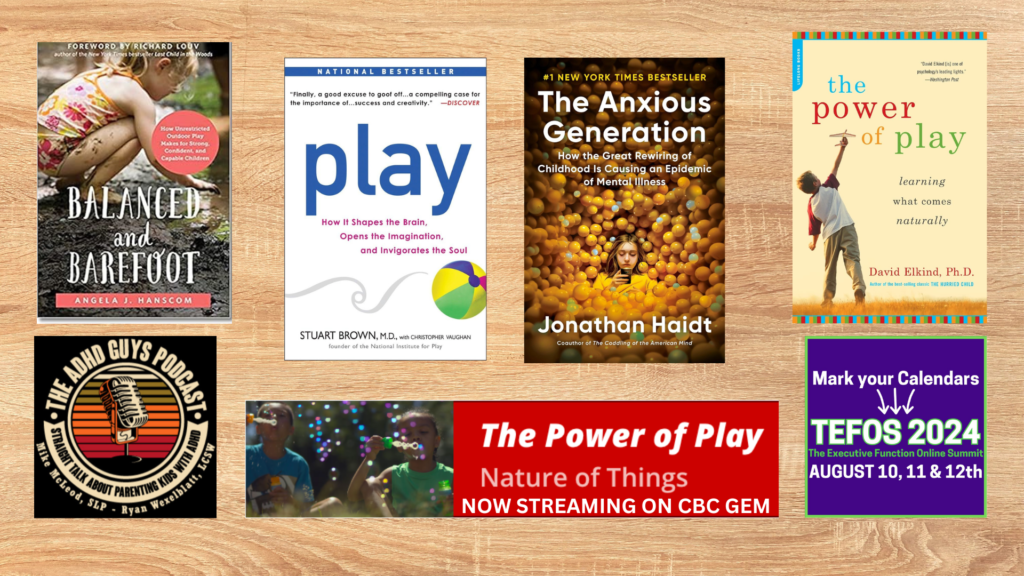Have you ever wondered why children seem so immersed in play, as if it’s the most important thing in the world? What if I told you that for children, play is their most important work? Through play, children develop critical skills that shape their social and emotional development, and it’s much more than just fun and games.
The Serious Work of Unstructured Play
Unstructured play is when children have the freedom to use their imagination and creativity without fixed rules or adult intervention. When kids play without adults directing them, they have to figure things out on their own. They invent their own games and create their own narratives. And behind the joy and laughter, there is serious work happening—work that is crucial for their development.

Developing Social Executive Function Skills
Perspective-Taking
During unstructured play, children often engage in make-believe, taking on different characters, situations, and viewpoints. This helps them understand and appreciate others’ perspectives, laying the groundwork for empathy.
Cognitive Flexibility
Play often requires children to adapt to new rules or scenarios, enhancing their cognitive flexibility. If a game evolves or new friends join in, children must adjust their thinking and behavior. The ability to switch gears and adapt is vital for successful social interactions and problem-solving.
Communication and Reciprocity
Play is a natural avenue for children to practice communication and cooperation. They negotiate rules, collaborate on projects, and resolve conflicts. These interactions teach them how to effectively communicate, share, and work as a team—essential skills for any social setting.
Problem-Solving and Decision-Making
Every play scenario involves making decisions and solving problems. Whether they’re building a fort or deciding on the rules of a game, children are constantly honing their decision-making and problem-solving abilities. These skills are directly applicable to real-life situations, making children more adept at navigating challenges.
Risk-Taking and Resilience
Unstructured play often involves an element of physical and emotional risk-taking. Children learn that when things don’t go as planned, or when a fall results in a bump or bruise, they can bounce back. This experience with small risks helps build resilience, teaching them to overcome challenges and recover from setbacks.
The Importance of Real-World Play

While virtual play has its place, real-world play is irreplaceable. Interacting with real people in real time helps children develop the nuanced skills of social interaction – how to feel empathy, read facial expressions, understand body language, respond to others, and resolve conflict. Interacting as an avatar in digital games cannot substitute for the rich, embodied experiences of playing with peers in the physical world.
Little Life Lessons • BIG Life Skills
As parents, educators, and counselors, it’s our responsibility to encourage and facilitate unstructured play. By doing so, we help children develop the social executive function skills they need to build lasting friendships and navigate the complexities of life. Play is not just about having fun—it’s about growing, learning, and becoming resilient, adaptable, and socially skilled individuals.
During unstructured play, it is crucial for adults to provide the time and space for kids to explore options and discover what works best, with minimal intervention. This freedom allows children to truly engage in the process of learning and development on their own terms.
So, the next time you see children deeply engaged in play, remember that they’re hard at work. Through play, they are learning to connect, empathize, and thrive. Let’s give our kids the time and space they need to play, so they can grow into the best versions of themselves.
Resources on This Topic

A pediatric occupational therapist shows how outdoor play and unstructured freedom of movement are vital for children’s cognitive development and growth, and offers tons of fun, engaging ways to help ensure that kids grow into healthy, balanced, and resilient adults.
Play explains why play is essential to our social skills, adaptability, intelligence, creativity, ability to problem solve and more. Particularly in tough times, we need to play more than ever, as it’s the very means by which we prepare for the unexpected, search out new solutions, and remain optimistic.
An investigation of the nature of childhood, including why children need play and independent exploration to mature into competent, thriving adults.
This is one of my favorite reads on the topic of play-based childhood and how it relates to mental health!
Creative spontaneous play best sets the stage for academic learning. Children learn mutual respect and cooperation through role-playing and the negotiation of rules, which in turn prepare them for successful classroom learning – and life in general.
If you teach or parent boys with ADHD, tune in to learn about working with boys with ADHD, from a male perspective. Practical information to help you help your child reach their full potential. The ADHD Guys Podcast is Mike McLeod, SLP from GrowNow ADHD, and Ryan Wexelblatt, LCSW, from ADHD Dude. Two of my favorite authorities on ADHD and executive functioning.
takes us around the world to meet the people who are turning play science into one of the most promising areas of research today. One scholar, known as the “grandfather” of play, recognized play was essential to human nature as far back as 1966, finding that playing freely as a child is key to being mentally healthy as an adult.
This FREE online summit is all about Executive Function which is THE most important concept adults “should” understand, but don’t. Executive function skills are what we all depend upon to build and maintain happy, healthy, and successful lives. Hosted by Seth Perler, who always a great lineup of presenters. Parents, teachers, and counselors won’t want to miss this!

